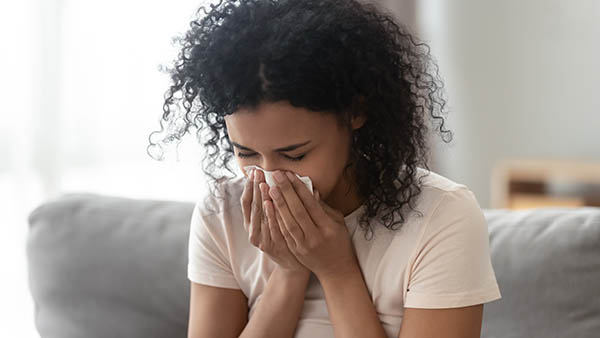Allergy
Love the Air You Breathe
Not all sinus and nasal symptoms indicate an infection. Although many patients receive numerous antibiotics and steroids, these medications may not appropriately treat the underlying cause of their symptoms-nasal allergies. In fact, we believe the majority of sinus issues start with uncontrolled allergies. Our innovative approach to allergy diagnosis and treatment will let you love the air you breath. Contact us today at 205.414.1368 to schedule your appointment.

How should you treat nasal allergies?
Allergy FAQs
What are your options?
The first and simplest treatment recommendation for allergic rhinitis is avoiding the allergens which are causing your symptoms. For instance, if you are sensitive to pets, you should keep your pet out of your bedroom, and not allow your pet to sleep in your bed. Drs. McCool and Bhuta can work with you to develop an avoidance strategy based on the nature of the allergen and availability of avoidance measures.
For more severe symptoms, multiple allergens, or year-long exposure, the next step in controlling your allergy symptoms is using allergy medications. There are three classes of allergy medications; 1) nasal steroid sprays, 2) antihistamines, either oral pills or nasal sprays, and 3) anti-leukotrienes such as Singulair. Often, a combination of these medications will give the most relief of nasal allergy symptoms. We also recommend nasal saline irrigations on a daily basis to help clean the nose and nasal sinuses. A short burst of oral steroids may be appropriate for some patients with severe symptoms or to gain control during acute attacks.
If avoidance measures and medications are not enough to relieve your allergy symptoms, then immunotherapy (IT) may be the best treatment option. In allergic rhinitis, the immune system is over-reacting to an otherwise harmless inhaled allergen, such as ragweed. The goal of IT is to desensitize you to your allergens, which then dramatically reduces your symptoms. IT is delivered through in-office injections, one to three times a week. Alternatively, you may choose daily drops placed under the tongue, called sublingual immunotherapy (SLIT), which you can perform at home.
Contact McCool and Bhuta Ear Nose and Throat Specialists today at 205-414-1368 to see how we can help you find relief from your nasal allergies.
What are allergy drops (SLIT)?
Allergy drops are known as sublingual immunotherapy (SLIT)?
Immunotherapy for allergies treats the cause of allergies by “turning down” or desensitizing you to your known allergens. Unlike injections in the arm, sublingual immunotherapy (SLIT) is given via drops under the tongue as a daily treatment. By slowly increasing the amount of the allergen over many months, your body learns to tolerate the allergens, thus reducing the allergic response and subsequent symptoms.
How does the process work?
The first step is to confirm a patient’s allergies through allergy testing. Then, a custom-mixed vial of drops is prepared for the patient. The patient takes drops under the tongue daily. The purpose of treatment is to give patients small doses of allergens in order to train the body not to react to its triggers. During the first four to six months, called the “escalation or build-up phase,” the dosage is gradually increased. After that, in the “maintenance phase,” the patient takes the same dose of drops each day. Although the full course of treatment can last years, many patients report improvement in their symptoms after just a few months.
Is sublingual immunotherapy safe?
The World Health Organization (WHO) has endorsed sublingual immunotherapy as a safe, effective, and viable alternative to injection immunotherapy for both adults and children. SLIT is widely accepted and used in European, South American, and Asian countries as well as in Australia and is gaining interest in the United States. Patients can take the drops in the convenience of their own homes instead of going to the doctor’s office every week for shots. .
How long must I continue the treatment?
We recommend that patients keep using the drops for three to five years so that the body will build up a lasting “tolerance.” However, most patients report significant symptom improvement after just a few months.
How can I limit my exposure to mold?
- Discard all old newspapers, magazines, books, old furniture, bedding, and clothing; eliminate dusty areas.
- Moisture-proof the basement or crawl space and keep these areas dry with a dehumidifier; maintain adequate ventilation.
- Remove plants, aquarium, herbarium, and dried flower arrangements from the home.
- Brush and air-dry work clothes outdoors and wash them frequently. Clothes dryers should be vented to the outside.
- Feather pillows may be tumble dried at 160 degrees for a few minutes to get rid of the dust and mold spores.
- Use pillow and mattress covers.
- Air conditioning will cut down on circulating spores by decreasing humidity.
- Keep clothes closets well ventilated and dry.
- Upper level bedrooms or apartments are drier than basement rooms.
- An allergy mask may be worn when working or cleaning highly contaminated areas.
What is a yeast free diet?
The goal of a yeast free diet is to reduce consumption of foods or drinks that 1) contain yeast or mold, such as baked goods and mushrooms; and 2) are high in carbohydrates, especially simple sugars. Why should you reduce carbohydrates in your diet? Because they are the “food” for yeast, and act to sustain the yeast and mold that you may consume. We have listed suggestions of foods to enjoy and to avoid. It is not a comprehensive list, but is meant to serve as a guide to help you maintain a yeast free diet. We recommend following these diet recommendations strictly for 8 weeks. Then, it is okay to reintroduce, slowly, some of these foods. However, if you develop symptoms while reintroducing these foods, you will need to remove these foods from your diet.
Contact McCool and Bhuta
for more information or to schedule an appointment.
205.414.1368

3055 Independence Drive | Homewood, AL 35209
205.414.1368 | info@entbirmingham.com

3055 Independence Drive
Homewood, AL 35209
205.414.1368
info@entbirmingham.com